Interview: Marina Costa-Jackson of EUGENE ONEGIN at McCaw Hall
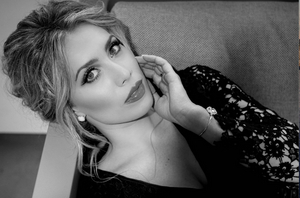
Marina Costa-Jackson was born to sing. She will demonstrate that in her role debut as Tatyana in Seattle Opera's upcoming production of Tchaikovsky's Eugene Onegin. The casting is appropriate, as she has performed in Russia with her sisters, as well as with the late Russian superstar baritone Dmitri Hvorostovsky.
Wedged in the middle between two other "Singing Sisters," Ginger and Miriam, Marina wasn't quite in tune with the idea of singing as her life pursuit until she reached her 20s. She started out as a mezzo, transformed into a soprano, and displayed her proficiency and talent as a Metropolitan Opera National Council Auditions winner in 2015. Having debuted as Fiordiligi to her sister Ginger's Dorabella in Seattle's Cosi fan tutte last season, Seattle audiences are eagerly looking forward to her Tatyana.
Erica Miner: Between your debut as Fiordiligi in Così fan tutte, your part in Three Singing Sisters with Ginger and Miriam this season, and now Tatyana in Eugene Onegin, we feel like you and your family of sisters are part of the Seattle family as well!
Marina Costa-Jackson: Yes! We hope we always have one Costa-Jackson in residence [Laughs].
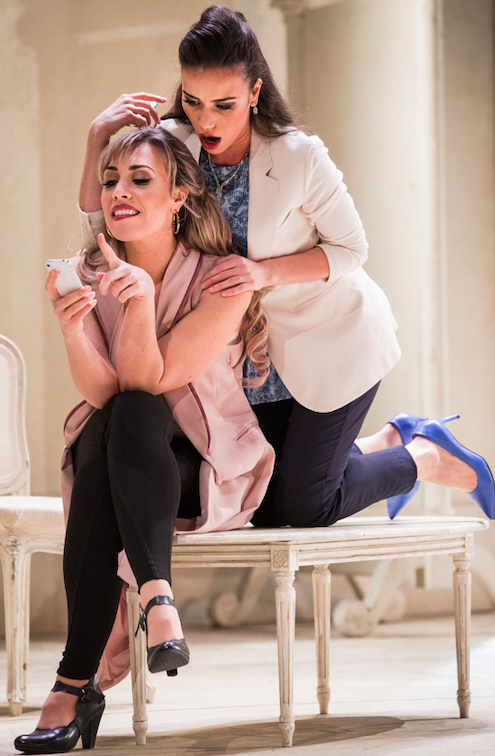
Philip Newton
EM: How are rehearsals going?
MC-J: So well. I love our cast. I think everyone's going to really like it here in Seattle. We're so excited.
EM: I loved your Fiordiligi last season.
MC-J: Thank you so much.
EM: Being born into such a musical family, albeit as the middle child, did you grow up feeling like becoming an opera singer was almost predestined?
MC-J: I grew up fighting it tooth and nail. Miriam, my younger sister, actually started when she was 11 or 12 years old. She was copying Pavarotti, the Three Tenors, singing Pagliacci and, O Mio Babbino Caro, with Maria Callas. Listening to full operas like I Puritani. What 11-year-old sits and listens to 3- or 4-hour operas? But Miriam did. So, she begged for voice lessons and my parents scrimped and saved and got her voice lessons. Then Ginger about a year later closely followed her. My whole soundtrack of my life growing up was my sisters singing opera, the tears, sweat, blood that go into it, the nervousness, all of that. As the middle child I ended up being indecisive and I truly didn't want to be a part of it. I didn't actually start till I was 21. It took me a long time.
EM: It's hard to resist. Sooner or later you give in.
MC-J: Absolutely. I tried pretty much every other thing. Writing, sports, ballet, cello. Finally, I did my Associate's degree and needed to take a specialization. I realized listening to my sisters singing--I think it was Lakmé duet--I thought, nothing is going to be as awesome as what they're doing right now, nothing could give me goose bumps, nothing could make me dream the way they could.
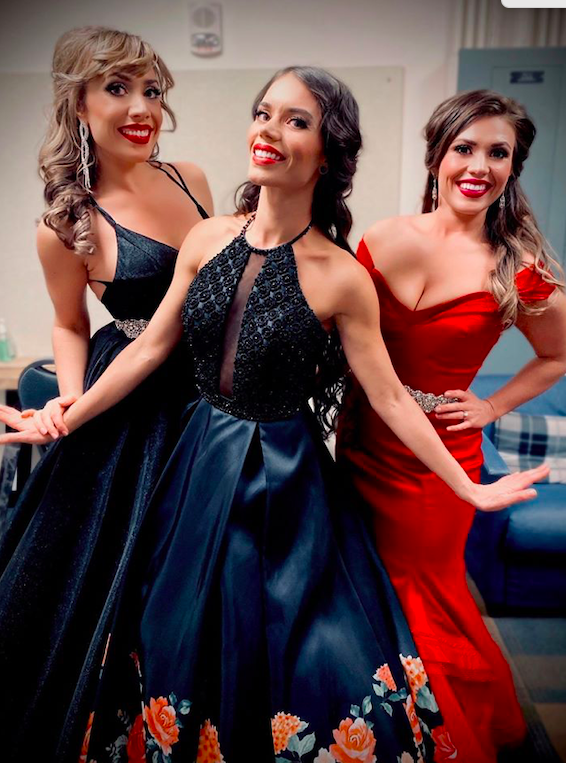
EM: You had an epiphany.
MC-J: Yes, truly.
EM: From Fiordiligi to Tatyana. Is that a big leap?
MC-J: Erica, listen. I love Fiordiligi. I thought it was such an awesome role. It was my first Mozart, so it was very intimidating for me. I wouldn't say I have the biggest voice in the world, but I have a pretty hefty volume-sized voice, pretty thick color. Singing something as disciplined as Mozart-I kind of felt I was in a straitjacket. With Tatyana, this is where my blood is. The "Russian soul," that dark soul. They even talk about it in the opera. Her sister teases her. "You're such a dark soul, you have this dark demeanor." There's something about Tatyana that calls to me. That daydreamer, figuring out who she is. I was her. One summer when I was 13 or 14, I wasn't very social. I would literally read-I read one summer 100 books. Tatyana, her nose always in a book, that was me when I was a teenager. I read romance novels, died with these characters that I saw myself in. I lived out my adventurous self through these books. It's really fun to sing someone like Tatyana because it just connects so deeply.
EM: Do you find singing in Russian a different challenge from Italian?
MC-J: Thanks to my mom and dad for speaking Italian to me, I don't have to think much about it. Russian is such a different language. I can understand and speak a lot of French because of the Italian. But Russian is so different, phonetically, the Cyrillic alphabet, these backwards sounds. But a lot of the main vowels are very like Italian vowels. And I find that Russian is so good for singing. I think it helps technique. I think everyone should sing Russian, even students coming up.
EM: It helps your development as a singer.
MC-J: Yes. I think it should be part of the standard repertoire. We do the 24 Italians songs when you first start singing. Everyone focuses on Italian, which you should, but I think giving yourself Russian, along with French and German, Russian is even better than German for singing.
EM: You've performed in Russia, on a cultural exchange tour.
MC-J: Yes. The first time--I've been back 3 times since then--there's nothing quite like singing in Russia. These people love the classic arts. Opera singers there are the rock stars, the "A" listers. They have Mariinsky Theatre 1, 2 and 3 now because they keep selling out performances. I once heard that 40% of the audiences at the Met are Russian or of Russian descent. These people really love the arts. Maybe that's why their music is so incredibly beautiful. They have a profound love and knowledge of the singing arts, this beautiful art form.
EM: You also performed in Moscow with the late, great Dimitri Hvorostovsky.
MC-J: Yes, that's one of the highlights of my career. I got to sing in this cultural exchange, but not only that--I died [Laughs]--while we were auditioning for the opera houses there--at that time I didn't know when I'd be back--so Hvorostovsky's close friend, the conductor Constantine Orbelian, who set up and produced most of his concerts and recorded CDs, set up this audition for my sister Ginger and I. In the middle of me about to sing Un ballo in Maschera, "Morrò, ma prima in grazia, her begging to her husband, walks in this man with white hair. I literally was a puddle on the floor. I was about to start and he said, "Oh, I'm late. Let's start again." I got to sing the aria to one of the greatest Renatos of all time. Later on he invited us to "Hvorostovsky and Friends." It was a fateful day for me.
EM: I'll never forget when I was in the Met pit the first time he walked onstage. Every female in the orchestra, our mouths dropped to the floor, we were all staring at him.
MC-J: [Laughs]
EM: Your former teacher, the wonderful Ariel Bybee, was one of my colleagues at Tanglewood and then at the Met. Such a great artist. We miss her terribly. What was it like studying with her?
MC-J: She was the most generous, intelligent-the way she spoke about voice-she knew it in and out. She truly loved the art form and it showed in everything she did. She was very generous with me. There was a time before I auditioned for AVA (Academy of Vocal Arts) I had no money to give her. It makes me want to cry, because she gave me free lessons for a very long time. She gave me dresses to wear from her wardrobe... [Tearful]. She really took people under her wing. She is greatly missed for sure. I'm studying with Bill Schuman now, but when I would go back home I still would go back to her and take some lessons and visit. I was very privileged to have her in my life.
EM: A really great teacher is one of the most important things for a budding artist.
MC-J: It really put me on my path. Going to a place like AVA studying with Bill Schuman, teacher for the stars, working with Maestro Macatsoris-those are the things that put you where you need to be to have a career. Ariel opened that door for me. Being in a good enough place technically to show my talent--Bill Schuman nurtured it even further. But people who open that gate for you can really make such a difference in the path you take. I'm very grateful to her.
EM: Your versatile range of repertoire reaches across a wide swath of the soprano fach. Mimi in La bohème, Desdemona in Otello, Giulietta in Tales of Hoffman and more. How would you define your voice? Soprano? Mezzo? Both?
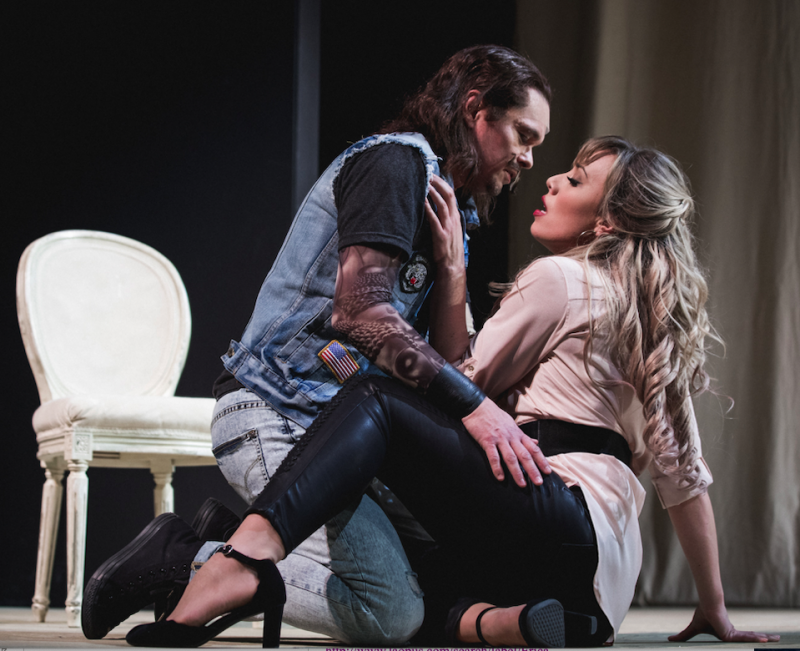
MC-J: This is something that I think a lot of singers, and even my sister Ginger, have in common. Voices are so fluid and to be able to try to classify them strictly, at least in my case, doesn't really work. I am a soprano, but one who's very comfortable in my middle and low range. I'm always working on my top, but if it feels good I just want to do it, anything that lets me sing in my middle for the most part and I can use my text and words to try to create the most beautiful phrases I can. That's most comfortable and that's why Tatyana feels so good to me. She does have the big moments-they're not hugely high notes, they're above the staff, especially in the Letter Scene, but then it comes fully into the middle. I feel my voice lends itself well to roles like this because I really can be fully in the middle. That's the nature of my instrument. I can produce exciting sound in those areas of the voice.
EM: It defies definition.
MC-J: The answer is not to define it but to do what feels best at the end of the day [Laughs]
EM: Among your many roles, are there any others that you particularly love to sing?
MC-J: The Verdi heroines. I love Mimi and I would love to do the heavier Puccini, but I don't know if I'm necessarily ready to do it. I think I have to find myself in a situation where I'm actually doing it and then I'll decide at that point. But a role like Desdemona, the beauty of tone that you have to have in your middle voice. And then the scene where he throws her to the ground and publicly calls her a whore, you have to have the grit, the Russian soul in a way, that sound that I feel my voice can do very well. In the last act you have to have tenderness, warmth, you have to melt people's hearts. Not to be cocky, but I do feel that my instrument is unique in that I can offer that rich, warm Italianate sound that you want in that role, Or Elisabetta in Don Carlo. I can float the low notes of the high notes. My voice can lend itself well. I know where my weaknesses are but my strengths play really well for certain characters.
EM: Perhaps Verdi is the composer you feel closest to?
MC-J: Verdi is the one that is best for my voice color. But there are challenges to every role. It's like exercising. It'll keep me lean, but also show off what I can do. One day I would love to sing again-I sang it in school-Lisa in Pique Dame. That's something I can't sing every day, but Desdemona I could sing every day and still be vocally healthy.
EM: What about Lisa do you find especially challenging?
MC-J: Here's the difference. With Verdi, you have to be able to languish in a beautiful, lyric way, plus the grit. Lisa, especially in the act where she jumps into the river, is like Puccini style, even darker because it's Russian, anguish and torment, misery. But with that kind of music you just can't help but let it come into the technique. That's the price to pay. Of course, you're not going to want to scream as loudly as possible, but it does take a toll, singing that torment. It's not the healthiest vocal line. Whereas Verdi will write healthier vocal line.
EM: He really cared in his writing about what it meant to the singers physically and vocally.
MC-J: Singers who take on those Tchaikovsky roles are willing to take on vocal difficulty and still be as healthy as possible. That's the goal, right?
EM: Which roles haven't you sung that are on your wish list?
MC-J: As I'm getting older and doing more things there's not as much as I wish I could do. When I first was singing, I wanted to do Violetta, and I have in a few productions. But this is no longer a dream for me in the sense that this is a character I want to stay with me for the rest of my life. As my voice becomes richer and more mature, I would love to go back and visit Lisa or Amelia in Ballo in Maschera. These are two roles I sang in school that I'd really love to do professionally. I wasn't able to give everything I could give now, or even in 10 years. I'm going to do Simon Boccanegra, the more lyric side of Verdi heroines, in Washington, D.C. I'm excited to revisit these heroines who are not so much about, like Violetta's vocal fireworks. I always settled into her in Act 2 and 3. The more mature heroines in the way they express themselves, more experienced in life.
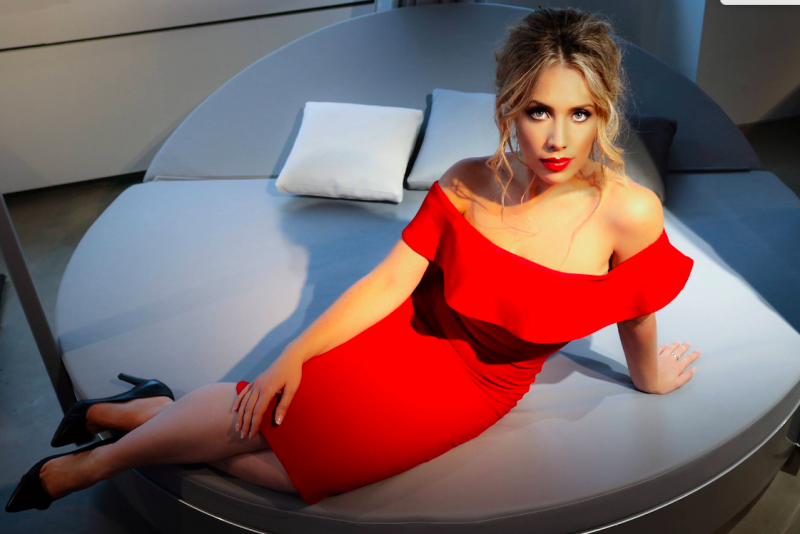
EM: What's coming up after Onegin?
MC-J: Mimi in Paris, which I'm really excited about.
EM: It doesn't get better than Mimi--in Paris.
MC-J: [Laughs] Yes, right? A couple of things they haven't announced yet.
EM: Marina, this has been absolute delight.
MC-J: For me as well.
Photo Credits: Courtesy of the Artist, Philip Newton
Comments

Videos

